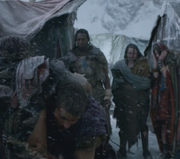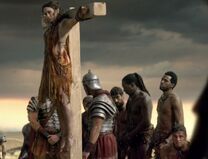| Litaviccus | ||
|---|---|---|

| ||
| First appearance | S0E01: Past Transgressions S3E01: Enemies of Rome | |
| Last appearance | S3E10: Victory | |
| Profession | Gladiator, The House of Batiatus Escaped Slave Rebel | |
| Race | Numidian | |
| Relationships | Spartacus (Leader, deceased) Titus Lentulus Batiatus (Dominus, deceased) Quintus Lentulus Batiatus (Dominus, deceased) Ulpius (Former Doctore, deceased) Oenomaus (Doctore, deceased) Gannicus (Friend, deceased) Kraynos (Friend, deceased) Fulco (Friend, deceased) Ortius (Friend, deceased) Barca (Friend, deceased) Auctus (Friend, deceased) Leviticus (Friend) Ashur (Rival, deceased) Dagan (Rival, deceased) | |
| Status | Deceased (Crucified by Roman Soldiers, on Crassus' orders) | |
| Actor/Actress | Uncredited | |
Litaviccus was a high-ranking gladiator for the house of Batiatus, and later a rebel of note under Spartacus' command.
Character Outline[]
Litaviccus is a tall man with a muscular build, at different points wearing his long black hair in braids or locks. His exact origin is never stated, but he may be from one of the peoples of the south-western Mediterranean, such as the Kingdom or Federation of Numidia. Litaviccus boasts superb skills in combat, as evidenced by his long career as a respected gladiator, by his position in the rebel army, and by his survival up to the final battle of the war. He spends time among the strongest gladiators when at the ludus, and is trusted with sensitive tasks as a rebel. He is typically seen training and fighting with a single-sword, but his exact fighting style(s) is unknown.
Gods of the Arena[]
A member of Batiatus' Ludus, he is often seen training and socializing with the other gladiators. He participates to some degree in Barca and Auctus' bullying of Ashur and Dagan, at one point performing "cheers" with Fulco after successfully soiling their food.
Litaviccus would then bear witness to when Ulpius goes mad and try to kill Oenomaus in a seeming fit of jealousy, only to fall at his student's hands.
He is present when Auctus, Gnaeus, Barca and Crixus leave the ludus for the Old Arena.
He would be present when Batiatus makes his speech to all avaiable gladiators in the ludus during his father's funeral before Oenomaus, now fully embracing his role as Doctore, gives the signal for the gladaitors to begin their training once again to honor the dead.
When Gannicus is granted freedom, Litaviccus and the other gladiators bid him farewell and see him out of the ludus before resuming their daily training.

Litaviccus as a Gladiator.
War of The Damned[]
Having originally not been a visible part of Spartacus' army following his escape from the ludus, it is possible that Litaviccus parted from his fellow gladiators after the uprising. In any case, he is a prominent warrior in the rebel army by the time they defeat Cossinius and Furius. If he did part from the rebels originally, he joins back up with them as the army grows. His whereabouts during the interval are unkno

Litaviccus rampages through Sinuessa.
wn.
He takes part in the sacking of Sinuessa and is among those rebels who attempt to engage Ennius as he threatens to blow up the granary. With the assault a success, Litaviccus settles in with the rest of the army inside the walls of the sacked city.
When the city is being evacuated prior to the Roman attack, Naevia specifically asks for Litaviccus to assist the Rebel Mother in her effort to get outside the city walls. This implies Litaviccus has a reputation for responsibility, honor, and integrity.
When the city falls to Crassus, Litaviccus follows with the rest of the army into the mountains where they are soon tr

apped by Crassus's Wall. Along with a handful of other freezing Rebels, he witnesses firsthand the fist fight between Spartacus and Crixus.
Litaviccus survives in the snowy mountains and escapes through Crassus' wall with the others.
When Spartacus and Crixus eventually decide to take Separate Paths, Litaviccus chooses instead to stay with Spartacus and take the path in order to escape the Republic and over the Alps.
Following the death of Crixus, Spartacus captures a clutch of Roman soldiers, including

Litaviccus awaiting to be crucified.
Crassus' son, Tiberius. Litaviccus watches as a spectator as a few of his fellows fight the Romans in the pale shadow of the arena of old. After the games conclude and the 500 rebel prisoners are reunited with the rest of rebels along with Tiberius' death, Litaviccus stands among the others as they mass before Crixus' funeral pyre while Spartacus instigates a chant of the names to all who had fallen for them to be free.
When the time comes for the final battle to commence with Crassus, Litaviccus remains is to go into battle with many other rebels to give the non-combatants the time to cross the Alps into true freedom. Litaviccus fights hard and slays many Romans, yet in the end he is defeated and captured.
Following his capture, he stands alongside Kraynos awaiting crucifixion.
Trivia[]
- Though a Numidian, the name Litaviccus is in fact Gaulish. In his Commentaries on the Gallic War, Julius Caesar records a general of the Aedui tribal confederation named Littaviccus, whom despite being given orders by the tribal oligarchy, who were allied to Rome, to aid Caesar's forces, instead led his army into defecting to the cause of Vercingetorix of the Arverni, whom led the Gaulish resistance against Caesar.
- Litaviccus may originate from the agricultural Bafour (pre-Haratin people) or the nomadic Melanogaetuli (Black Gaetulians described by Ptolemy Claudius) of Algeria, who were among the allies of the Numidian kingdom.